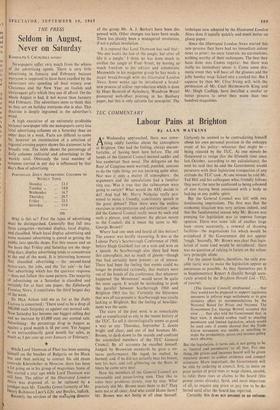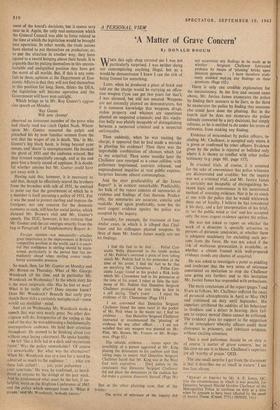TUC COMMENTARY
Labour Pains at Brighton
By ALAN WATKINS
A s Wednesday approached, there was some- ilk thing oddly familiar about the atmosphere at Brighton. One had the feeling, always uncom- fortable, of having been here before. The old hands of the General Council seemed sadder and less exuberant than usual. The delegates on the floor of Congress were worried, puzzled, anxious to do the right thing, yet not knowing quite what. Nor was it only a matter of atmosphere : the arguments and the speculations had a familiar ring too. Was it true that the railwaymen were going to switch? What would the AEU decide to do? And had Mr. Harry Nicholas really pro- mised to make a friendly, conciliatory speech in the great debate? Then there were the endless exercises in interpretation and construction : what did the General Council really mean by such and such a phrase, and, whatever the phrase meant to the Council, did it mean the same to Mr. George Brown?
Where had one seen and heard all this before? The answer was hardly reassuring. It was at the Labour Party's Scarborough Conference of 1960, before Hugh Gaitskell lost on a vote and won on a speech. At Scarborough also there had been this atmosphere, not so much of gloom—though that had certainly been present—as of unease. There had been the feeling that events could no longer be predicted rationally, that matters were out of the hands of the conference, that whatever happened 'the Movement' would never be quite the same again. It would be misleading to push the parallel between Scarborough 1960 and Brighton 1965 too far. Certainly the bitterness that was all too present a: Scarborough was totally lacking at Brighton. But the feeling of bewilder- ment was the same.
The story of the past week is as remarkable and as complicated as any in the recent history of the TUC. To tell it chronologically seems as good a way as any. Thursday, September 2, dawns bright and clear, and out of bed bounces Mr. Brown, to dash down to the seaside and confront the astonished members of the TUC General Council. By all accounts he excelled himself. Judged by Brownian standards he gave. a vir- tuoso performance. He raged, he melted, he burned; and, if he did not actually, beat his breast, tear his hair, and roll gibbering on the floor, at times he came very near.
Now the members of the General Council are reasonable and peace-loving men. They like to solve their problems slowly, step by step. What precisely did Mr. Brown want them to do? They were not at all clear. And who could blame them? Mr. Brown was not being at all clear himself. Certainly he seemed to be contradicting himself about his own personal position in the unhappy event of his policy—whatever that might be— being rejected by the TUC. At one minute he threatened to resign (for the fifteenth time since last October, according to my calculations); the next he said that he and the Government would persevere with their legislation irrespective of any attitude the TUC took. At one minute he told Mr. Ted Hill and his colleagues what friendly fellows they were; the next he confessed to being ashamed of ever having been associated with a body so lacking in any public spirit.
But the General Council was left with two dominating impressions. The first was that the economic situation was very serious indeed, and that the fundamental reason why Mr. Brown was pressing for legislation was to impress foreign opinion. There was some talk of another large loan—more accurately, a renewal of drawing facilities—the negotiations for which would be prejudiced if the Government did not appear 'tough.' Secondly, Mr. Brown was clear that legis- lation of some kind would be introduced; there was no question of relying in future on the volun- tary principle alone.
For the union leaders, therefore, the only pos- sible tactic was to make the legislation appear as innocuous as possible. As they themselves put it in Supplementary Report A (hastily though accu- rately printed by the Brighton Herald Ltd.—TU, of course):
[The General Council] emphasised . . . that they would not be prepared to support legislative measures to enforce wage settlements or to give statutory effect to recommendations by the National Board for Prices and Incomes. The Government [i.e. George Brown] accepted this view . . . they also told the Government that, in their view, it should confine itself to enacting permissive and limited legislation, which would be used only if events showed that the Trade Union movement was unable or unwilling to make the productivity, prices and incomes policy more effective.
But the legislation, it turns out, is not going to be as 'limited and permissive' as all that. For one thing, the prices and incomes board will be given statutory power to collect evidence and compel witnesses. More important, the Government will be able by ordering in council, first, to insist on prior notice of price rises or wage claims, second, to refer these rises or claims to the board (this power exists already), third, and most important of all, to require any price or pay rise to be de- ferred until after the board has reported.
Certainly this does not amount to an enforce- ment of the board's decisions, but it comes very near to it. Again, the only real concession which the General Council was able to force related to the time at which the legislation would be brought into operation. In other words, the trade unions have elected to put themselves on probation; or, to put the situation in another way, they have agreed to a sword hanging above their heads. It is arguable that by putting themselves in this uncom- fortable and undignified position they have got the worst of all worlds. But, if this is any com- fort to them, opinion at the Department of Eco- nomic Affairs is that they will not find themselves in this position for long. Soon, thinks the DEA, the legislation will become operative and the Government will have won outright.
Which brings us to Mr. Ray Gunter's aggres- sive speech on Monday.
'Ray Gunter Will now chunter' observed an irreverent member of the press who had clearly read too lauch Ogden Nash. Where- upon Mr. Gunter mounted the pulpit and preached his by now familiar sermon from the text that the wages of sin is death. 'Sin,' in Mr. Gunter's big black book, is living beyond your' means, and 'death' is unemployment. He invoked the ghost of 1931 and the audience winced. But they listened respectfully enough, and at the end gave him a hearty round of applause. It is doubt- ful whether anyone but Mr. Gunter could have got away with it.
Having said this, however, it is necessary to add that, though he effectively scared the brothers from the branches with talk of 1931, he omitted to point out that the government of which he is a member is itself pursuing a policy of 1931. For it was the need to protect sterling and impress the foreigner, not any concern for the domestic economy as such, still less for social justice, which dictated Mr. Brown's visit and Mr. Gunter's speech. The TUC, however, is less reticent than Mr. Gunter and the cat emerges smartly from the bag in Paragraph 5 of Supplementary Report A: Foreign opinion—not unnaturally—attaches great importance to the improvement of Britain's competitive position in the world, and it is essen- tial that confidence in sterling should be main- tained, particularly in the period that lies im- mediately ahead when sterling comes under heavy seasonable pressure.
So much, then, for Mr. Gunter on Monday and Mr. Brown on Thursday. What of Mr. George Woodcock all the time, and in particular Mr. Woodcock on Wednesday? In the whole story his is the most enigmatic role. Has he lost or won? What is he really after? Does anyone know? Does Mr. Woodcock? Beneath that curly grey thatch there ticks a curiously metaphysical—some would say muddled—mind.
And yet on Wednesday Mr. Woodcock made a speech that was very nearly great. No other des- cription will do. Irrespective of the voting at the end of the day, he was addressing a fundamentally unsympathetic audience. He held their attention throughout. He seemed to be thinking aloud (yet without once losing coherence). He spoke humbly —he felt 'like a little lad in a dark and mysterious forest.' Was the policy unworkable? 'Of course it's unworkable.' But what was the alternative? When Mr. Woodcock was at a loss for a word he admitted as much to the audience. `. . . what are these lads called? . . . yes, your policemen . . your sanctions.' He was, he confessed, as bewil- dered as anyone by the doings of the past week. And he pronounced what must be the last, if un- helpful, word on the Brighton Conference of 1965 and the policy which emerged from it. 'What it means,' said Mr. Woodcock, 'nobody knows.'



































 Previous page
Previous page